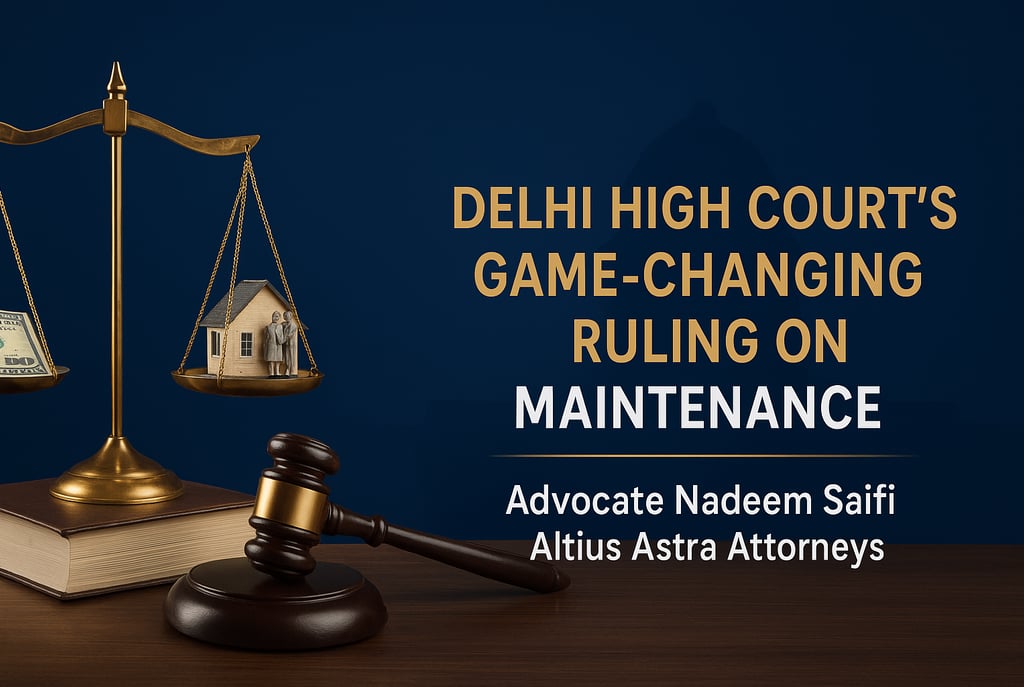Delhi High Court’s Bold Take on Spousal Maintenance: Can Financial Liabilities Reduce Support Payments?
In a significant Delhi High Court maintenance ruling, Justice Neena Bansal Krishna reduced spousal and child support by factoring in the husband’s home loan, rent, and parental responsibilities. Does this signal a shift in India’s approach to fair maintenance?
Adv Nadeem Saifi | Partner | Altius Astra Attorneys
9/3/20253 min read


When Maintenance Becomes a Tug of War
What happens when the legal duty to support a spouse collides with real-life financial obligations like home loans and parental care? The Delhi High Court maintenance ruling in Ankush Kumar Parashar v. Sapna @ Mona & Anr. has sparked a fresh debate on this very question.
The Court cut down the monthly maintenance from ₹25,000 to ₹17,500, observing that fairness in matrimonial law isn’t about draining one party dry—it’s about striking a balance. This judgment doesn’t just affect one family; it could redefine how maintenance disputes are argued and decided across India.
The dispute began when the Family Court ordered a husband to pay ₹25,000 per month to his estranged wife and child. Challenging this, he moved the High Court, arguing that the order ignored his actual financial condition.
Net monthly income of ₹36,000 (after deductions), not ₹70,000 as assumed.
A home loan EMI of ₹11,000, plus rent and expenses for both himself and his dependent parents.
Allegations that his wife was earning ₹15,000+ per month, though she did not disclose income details in court.
Justice Neena Bansal Krishna noted the wife’s silence on her own income and expenses, while the husband provided clear proof of liabilities. Taking these into account, the Court scaled the maintenance down to ₹17,500 per month—a compromise between fairness and practicality.
The Court’s Balancing Act: Fairness Over Formula
The High Court emphasized that maintenance must be “adequate but not crushing.”
Key Takeaways from the Ruling:
Support, not punishment: Maintenance should secure dignity for the dependent spouse and child, but not leave the payer impoverished.
Transparency is crucial: A spouse who withholds details of income weakens their claim.
Liabilities matter: Courts must recognize home loans, rent, and parental responsibilities as genuine financial burdens.
Context over rigid rules: Each case demands a tailor-made solution, not a one-size-fits-all formula.
This approach marks a shift towards realistic adjudication in matrimonial law, where judges are no longer looking at gross income in isolation but factoring in the actual cost of living.
This ruling isn’t just about one couple’s financial tug-of-war—it sets a tone for future disputes.
Promotes fairness in maintenance laws: Courts are acknowledging that one spouse’s comfort cannot come at the complete cost of the other’s survival.
Encourages accountability: Non-disclosure of income and expenses can backfire, nudging both parties to present accurate data.
Reflects modern realities: With EMIs, rents, and elder care becoming the norm, the decision resonates with India’s growing middle class.
Checks misuse: Maintenance isn’t meant to be a financial weapon in matrimonial battles—it’s a tool for survival and equity.
A Case of Balance, Not Bias
Legal commentators suggest that this ruling strikes the fine line between duty and practicality. On one hand, it reaffirms that a husband cannot shirk his responsibility toward his wife and child. On the other,it underscores that obligations like caring for elderly parents are equally valid.
Think about it—should a man servicing a hefty home loan and supporting his parents be expected to pay maintenance beyond his real capacity? Or should courts recalibrate support to reflect equity over excess? The Delhi High Court has clearly chosen the latter.
Conclusion: A Turning Point in Maintenance Jurisprudence?
The Delhi High Court’s maintenance ruling is more than just a financial recalibration—it’s a philosophical statement on fairness in family law. It acknowledges that justice must work for both sides, not tilt so heavily in favor of one that the other is left in financial ruin.
Will this nuanced approach redefine maintenance disputes in India? It just might. For now, this judgment stands as a reminder that law is not about rigid numbers but about balanced justice.
Altius Astra Attorneys
A premier law firm based in Delhi, India, offering legal representation across various practice areas for citizens rights and interests.
© 2025. Altius Astra Attorneys. All rights reserved.
Contact Us
📞 9899290789, 9818786756
📧 contact@altiusastra.com
3C-ED Block, Madhuban Chowk, Pitampura, Delhi-110034
DISCLAIMER
